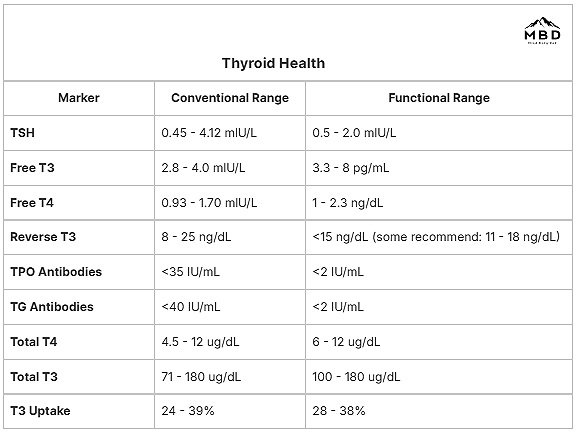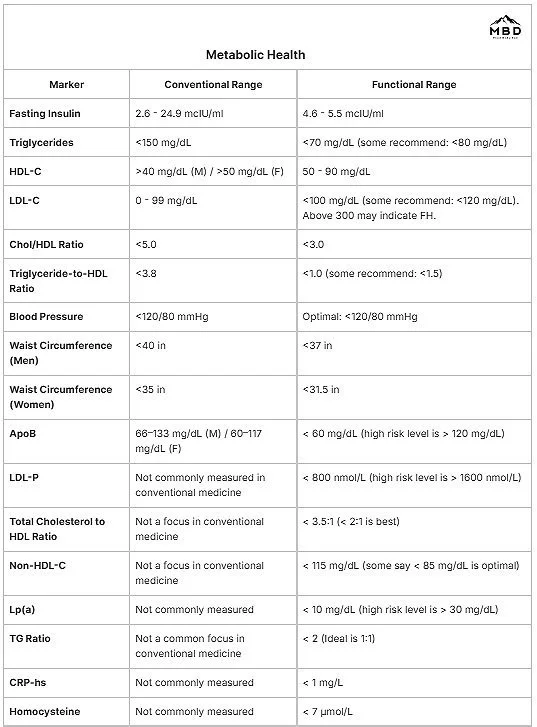Functional vs. Conventional Blood Ranges: What to Know
“The absence of disease does not mean the presence of health. Functional medicine shifts the focus from treating symptoms to optimizing function.”
— Dr. Frank Lipman
I recently got my bloodwork done at my annual physical. Like most people aiming for a healthy lifestyle, I was curious about more than just the standard panels. So, I handed over a laundry list of additional tests—because while conventional medicine checks for disease, I wanted to know where I stood on the optimal health spectrum.
The results came in. My numbers fell within the “normal” range, neatly highlighted by a color bar and an arrow. Good news, right? Maybe. But here’s the thing—I don’t want to be just normal. Normal, by definition, includes people who are tired, inflamed, or on the verge of chronic disease. What I want is to be optimal.
This is where functional medicine takes a different approach. Instead of waiting for a problem to hit the disease threshold, it looks at blood and lab values through a more refined lens, using narrower reference ranges to spot imbalances early. It asks: Are you thriving, or just not sick yet?
So, I took a deep dive into defining what “optimal” actually looks like—a blueprint I can revisit year after year to make sure I’m on track. Here’s what you need to know about the key differences between functional medicine vs. conventional medicine lab values—and why they matter for long-term health.
Why Functional Medicine Uses Different Lab Ranges
Conventional lab ranges are based on population averages. This means if most people tested have suboptimal health (which they do), the "normal" range reflects that. Functional medicine, on the other hand, defines optimal ranges—values associated with peak performance, longevity, and disease prevention.
Instead of waiting until something is broken, functional lab testing aims to catch imbalances early. By addressing issues before they manifest as symptoms, you have a much better chance of maintaining long-term health.
Key Functional Blood Test Ranges
Below is a breakdown of common blood markers, comparing conventional and functional medicine reference ranges.
Thyroid Markers
Most conventional doctors only test TSH (Thyroid-Stimulating Hormone), but a full picture of thyroid health requires looking at Free T3, Free T4, Reverse T3, and antibodies.
Blood Sugar and Metabolic Health
Functional medicine takes a stricter approach to metabolic health, especially in detecting early insulin resistance. Many people with "normal" fasting glucose are already developing blood sugar dysregulation.
Inflammation & Cardiovascular Risk
Chronic inflammation is a major driver of disease, but standard labs often miss early warning signs. Functional medicine uses more precise markers to assess risk.
What This Means for Your Health
Functional medicine isn’t about replacing conventional medicine—it’s about expanding its capabilities. If your doctor tells you your labs are "normal" but you still feel off, consider looking at functional ranges to get a clearer picture of your health.
By taking a proactive approach and addressing imbalances before they become diagnosable conditions, functional medicine can help you optimize performance, energy, and longevity. If you want to go beyond just being "not sick" and move toward feeling your best, functional blood testing could be the key.
Would you rather wait for disease to show up on a standard test, or optimize your health now? The choice is yours.
Looking for what these mean and what to do with these numbers? Check out these two other articles:
Disclaimer
I am not a doctor, and this article is for informational purposes only. Lab values can be influenced by various factors, and deviations from functional ranges do not necessarily indicate a specific disease or condition. Always consult with a qualified healthcare provider for personalized medical advice and proper interpretation of lab results.
References: Source 1, Source 2, Source 3, Source 4, Source 5
Related:




